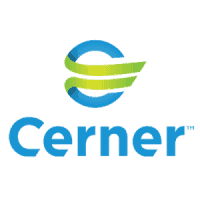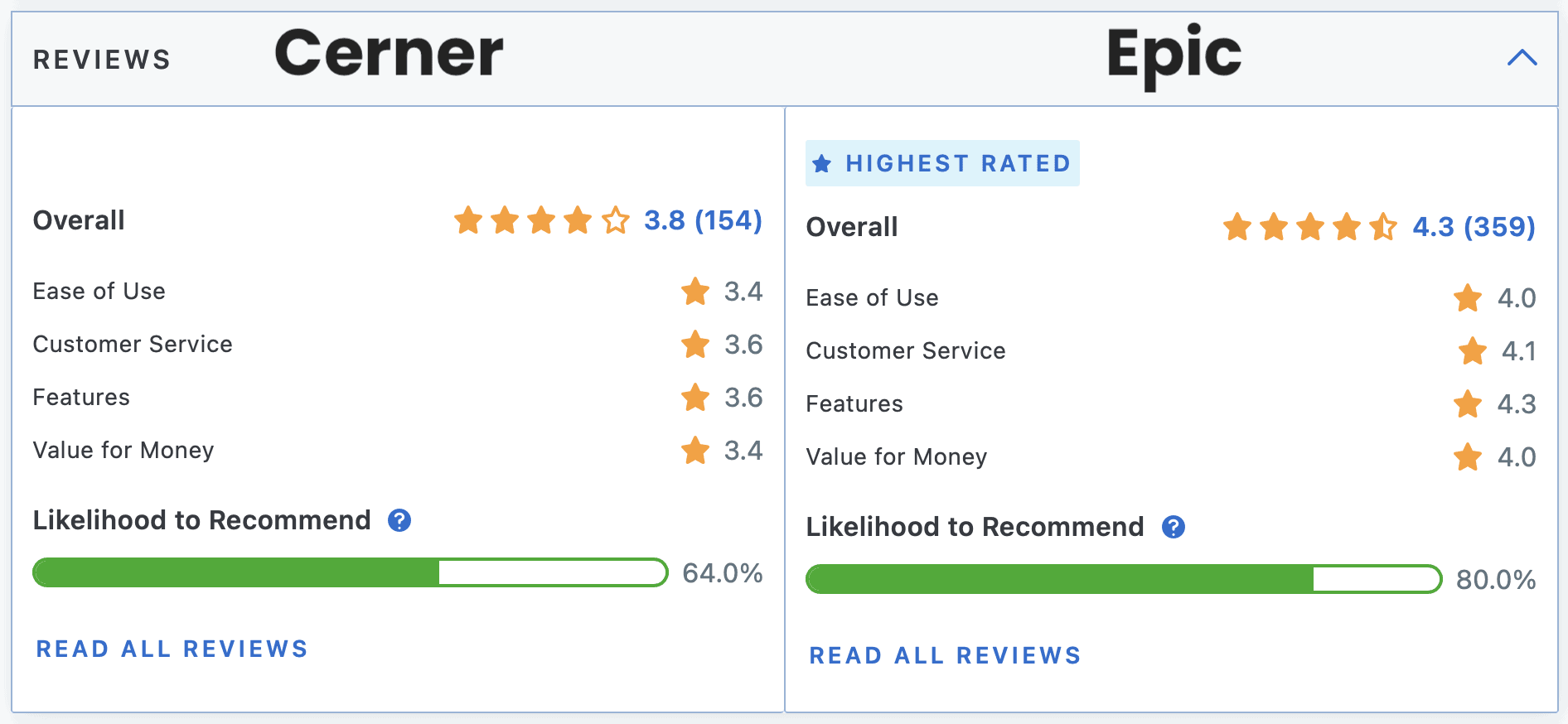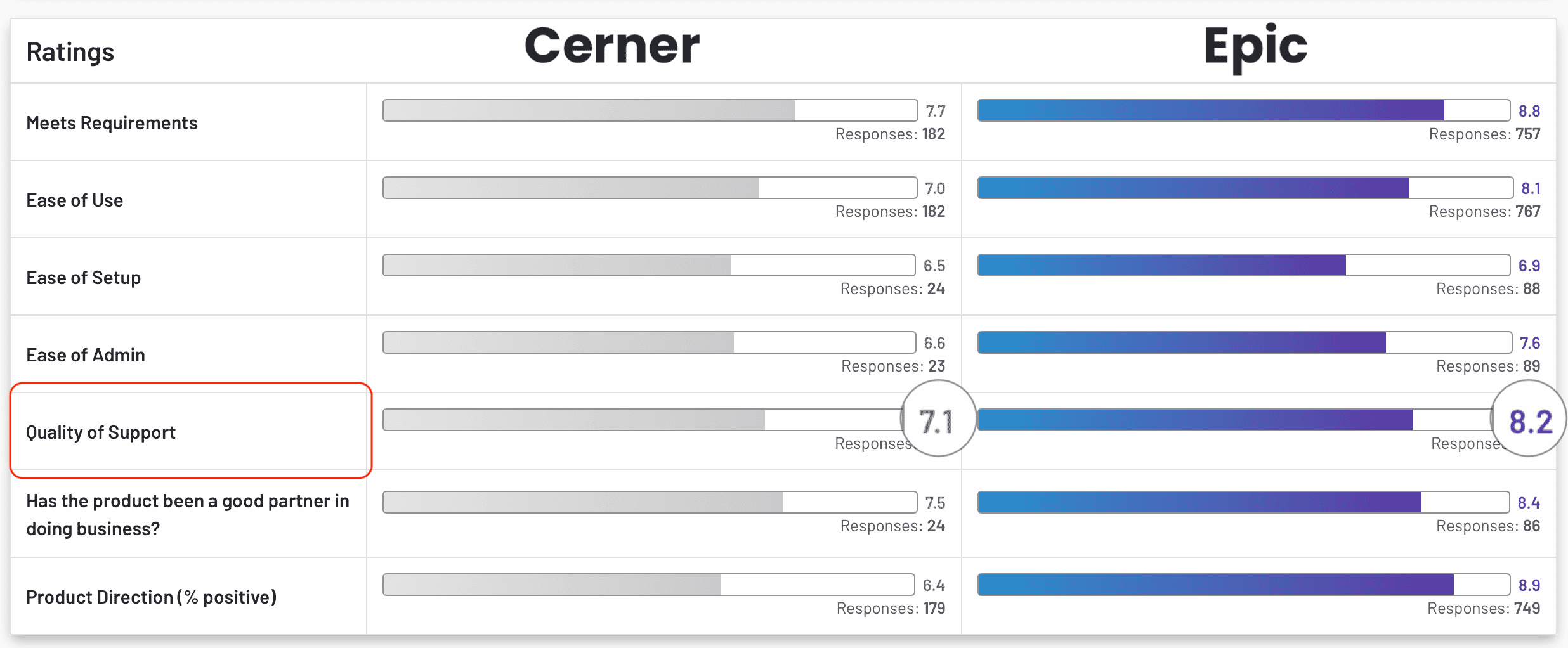Are you tangled up in the “Cerner and Epic comparison” conundrum? You’re not alone. As the leading EHRs slash medical software platforms, Epic and Cerner have carved out significant market shares. But how do they stack up against each other?
For many hospitals and clinics, the choice of Epic Systems vs Cerner comes down to evaluating specific functionalities tailored to their needs. Let’s unravel the complexities.
Top Takeaways:
- Difference between Epic and Cerner: Both Epic and Cerner offer comprehensive EHR solutions but shine in different areas. Epic, recognized for its robust functionality and extensive customization options, is often the go-to choice for large healthcare organizations. On the other hand, Cerner stands out with its cost-effectiveness and impressive data analytics capabilities.
- Epic vs Cerner: It’s all about market dominance and bed coverage. Epic leads with a 36% market share and serves 48% of the beds in the United States, while Cerner follows closely with a 25% market share and 26% bed coverage. But does size equate to quality? Let’s delve into the details in this Epic and Cerner comparison guide.
- Security and Compliance: Both Epic and Cerner prioritize security and compliance. With robust measures such as role-based access controls, data encryption, and regular security audits, they ensure patient data remains protected.
Table of Contents:
- The Importance of Choosing the Right EHR System
- Deep Dive into Cerner and Epic Product Offerings
- Unpacking the Key Features of Cerner and Epic
- Diving into the User Experience and Interface of Cerner and Epic
- Interoperability: Integration Capabilities with Other Healthcare Solutions
- Security and Compliance: How do Cerner and Epic Measure Up?
- Implementation and Support: A Comparative Review
- Cost Analysis: Cerner vs Epic
- Topflight’s Experience with Epic and Cerner
- Making Your EHR Choice – There’s More to Consider.
The Importance of Choosing the Right EHR System
In the rapidly evolving landscape of healthcare technology, one decision stands as crucial for any clinical executive: choosing the proper Electronic Health Record (EHR) system. Why is this decision so vital? An EHR system is more than just a digital version of a patient’s paper chart. It’s a tool that permeates nearly every aspect of health care — from clinical or ambulatory care to administration, from finance to legal. A well-chosen EHR can streamline processes, enhance patient care, and, ultimately, drive success.
Understanding EHRs: Cerner and Epic
Now that we’ve established the importance of EHRs, let’s focus on two of the industry’s heavyweights: Cerner and Epic. These titans dominate the EHR market and have shaped the way healthcare providers manage patient information.
According to a May 23 KLAS Research report, these EHR systems hold an impressive 61% of the market share. Epic leads the pack with a hospital market share of 36%, closely followed by Cerner with 25%.
When we delve deeper and look at the amount of bed coverage each EHR system has, the market share landscape takes on an even more stark contrast. Epic dominates the field, providing services for a whopping 48% of the beds in the market. And Cerner’s slice of the pie is considerably smaller, with a 26% share in bed coverage.
This dominance speaks volumes about their influence in the industry.
So, what sets them apart? What makes one a preferred choice for some healthcare providers over the other? And most importantly, which one is best suited for your organization?
These are the questions we’ll be exploring in this comprehensive comparison. With a focus on everything from product offerings to user experience, integration capabilities, security measures, cost analysis, and more, we aim to provide you with the insights you need to make an informed decision.
Quick question: “What is Epic and Cerner?”
Quick answer: “Imagine having all patient data in one place. That’s what Epic and Cerner do. They’re industry-leading EHR systems that revolutionize patient care and data management in the healthcare industry.”
The Role of EHRs in Healthcare
EHRs play an integral role in modern healthcare. They offer an array of benefits, including improved patient care, increased patient participation, improved care coordination, and practice efficiencies. They allow healthcare professionals to access and share patient information, leading to more informed decision-making and better health outcomes.
Brief History and Evolution of Cerner and Epic
Cerner and Epic are more than just healthcare software companies; they’re titans that have left indelible marks on the electronic medical record (EMR) industry. The journey of these two giants, from humble beginnings to global dominance, is nothing short of inspiring.
Let’s start with Cerner. Co-founded in 1979 by three enterprising individuals – Neal Patterson, Paul Gorup, and Cliff Illig – Cerner corporation was born out of a vision to make health care safer and more efficient. From its initial focus on laboratory health information systems, Cerner has grown exponentially over the years.
In a landmark event in 2022, Oracle acquired Cerner in a deal worth a staggering $28 billion. Today, this EHR platform serves over 27,500 facilities worldwide, providing comprehensive clinical solutions that touch every aspect of patient care. Isn’t it incredible how far they’ve come?
Now, let’s turn our attention to Epic. Launched just a year later, in 1980, Epic started as a small team with a big dream: to create EHR software that would give patients and providers better control over healthcare decisions. Fast forward to today, and Epic’s software is used by more than 250 million patients globally. That’s roughly 3% of the world’s population!
Also Read: Medical LLM Models Explained
The growth of both Cerner and Epic into multinational corporations is a testament to their ability to innovate and adapt in a rapidly evolving industry. But as they continue to grow, one question remains: which of these industry leaders is the best fit for your organization? Stay tuned as we delve deeper into their offerings, capabilities, and more.
Quick question: “Is Cerner better than Epic?”
Quick answer: “It’s not a simple yes or no answer. Each system has its strengths. Cerner, for example, is often lauded for its cost-effectiveness and robust data analytics. It’s also noted for its specialty-specific solutions, making it an attractive choice for niche clinics. But remember, the ‘better’ system hinges on your organization’s specific needs, size, and budget. So, what’s crucial for one healthcare setup might not hold the same weight for another.“
Why Compare Cerner and Epic EHRs Specifically?
Given their market dominance and comprehensive offerings, a comparison between Cerner and Epic is natural. Both offer robust, feature-rich solutions that cater to a wide range of healthcare providers. But despite their similarities, they also have unique strengths and weaknesses that can make one a better fit for your organization than the other. And it’s these nuances that we’ll explore in this blog so you can decide which is better, Epic or Cerner, for your organization.
Deep Dive into Cerner and Epic Product Offerings
In the world of healthcare, EHR systems are more than just digital record systems; they’re comprehensive solutions designed to streamline workflows, enhance patient care, and drive operational efficiency. Today, we focus on two industry leaders: Cerner and Epic.
Detailed Analysis of Cerner’s Main Software Products
Cerner’s suite of software products offers a range of cloud-based solutions tailored to healthcare providers’ diverse needs. Let’s take a closer look:
- Cerner Millennium: This flagship EHR platform integrates data from various sources, providing a holistic view of patient health. With modules for clinical documentation, order management, results reporting, and more, Millennium is more than just an EHR—it’s a complete healthcare solution.
- Cerner PowerChart Ambulatory EHR: Real-time access to patient information is crucial in healthcare, and that’s precisely what PowerChart delivers. This clinical workstation solution enables healthcare providers to make quick, informed decisions.
- Cerner CareTracker: Designed for skilled nursing facilities and assisted living centers, CareTracker is Cerner’s long-term care EHR solution. It streamlines care coordination, enhancing patient outcomes and operational efficiency.
Quick question: “Are Cerner and Epic competitors?”
Quick answer: “Absolutely! It’s a constant battle between these two giants for dominance in the EHR market. Each offering their unique features and capabilities, they continuously vie for the top spot.”
Detailed Analysis of Epic’s Main Software Products
Epic’s software products are equally diverse, offering solutions tailored to various healthcare settings and needs:
- EpicCare: Epic’s core EHR system, EpicCare, provides modules for clinical documentation, order entry, decision support, charting system, and more. It’s a comprehensive tool that puts everything healthcare providers need at their fingertips.
- Epic MyChart: Epic’s patient portal, MyChart, puts patients in control of their healthcare. It allows them to access their health records, communicate with healthcare providers, and manage their healthcare online. Naturally, MyChart also allows patients to schedule appointments.
Related: Best Patient Scheduling Software
- Revenue Cycle Management (RCM): Epic’s RCM is a comprehensive solution for managing financial processes. It covers everything from billing and claims management to revenue optimization, ensuring that the financial side of healthcare runs smoothly.
- Healthy Planet: Healthy Planet is Epic’s population health management platform. It helps healthcare providers analyze and manage patient populations, view patient data, identify risks, and implement targeted interventions.
- Tapestry: Designed for mental health and substance abuse treatment providers, Tapestry is Epic’s behavioral health EHR solution.
Related: Surescripts Integration Main Steps
Please note that we are solely focusing on crucial product offerings from each EHR vendor in this review and will not be comparing non-essential features such as “Cerner vs Epic: Nursing” as both vendors perform equally well in this aspect.
Comprehensive Comparison: Epic vs Cerner Key Product Offerings
Of course, it’s hard to discuss Epic and Cerner pros and cons without closely examining how their key features compare. Here’s a summary of the main software products in the Epic versus Cerner standoff:
| Product | Cerner | Epic |
| Core EHR System | Millennium | EpicCare |
| Clinical Workstation Solution | PowerChart / Cerner Kiosk | N/A |
| Long-term Care EHR Solution | CareTracker | N/A |
| Patient Portal | HealtheLife / Cerner Health | MyChart |
| Financial Management Solution | N/A | Revenue Cycle Management (RCM) |
| Population Health Management Platform | HealtheIntent | Healthy Planet |
| Behavioral Health EHR Solution | N/A | Tapestry |
One significant aspect of evaluating Epic EHR vs Cerner is their potential for revenue generation, particularly for large healthcare organizations.
While both Cerner and Epic EHR systems offer robust EHR solutions, their product offerings differ significantly. So, which one is right for your organization? That depends on your specific needs, objectives, and context.
Unpacking the Key Features of Cerner and Epic
Choosing an EHR system isn’t a decision to be taken lightly. With so many factors to consider, it’s crucial to delve deep into the critical features of each platform. Today, we’ll explore the notable features of Cerner and Epic, two leading EHR platforms that have cemented their place in the healthcare industry.
When discussing the merits of Cerner EMR vs Epic, it’s crucial to consider integration with mobile devices for on-the-go access to patient records.
In-depth Exploration of Cerner’s Key Features
Cerner is recognized for its comprehensive suite of software products designed to streamline clinical workflows and enhance patient care. But what makes Cerner stand out? Let’s break it down:
- Holistic Healthcare Management: With features covering appointment management, billing management, clinical workflow management, EMS, document management, EM coding, insurance and claims management, lab integration (for getting lab results), medical templates, patient demographics, and patient history, Cerner provides a complete healthcare management package. This also includes the Cerner PHR (personal health record) platform for patients.
- Specialty-Specific Solutions: Cerner supports a wide range of medical specialties, including allergy and immunology, cardiology, dermatology, gastroenterology, mental and behavioral health, neurology and neurosurgery, obstetrics and gynecology, orthopedics and sports medicine, pediatrics, pulmonology, radiology, urology, and more. This means that regardless of your healthcare domain, Cerner has you covered.
- Interoperability: Cerner’s robust integration capabilities with other healthcare solutions enable seamless data exchange, fostering better collaboration and patient care.
- Security and Compliance: With stringent measures in place to protect patient data and ensure adherence to HIPAA regulations, Cerner prioritizes security and compliance.
- Support Services: Cerner’s dedicated implementation and support services assist healthcare organizations in adopting and optimizing their EHR system, ensuring a smooth transition and efficient use of the platform.
Note that one of the disadvantages of Cerner is its complexity for smaller practices, especially those in urgent care settings.
Quick question: “Is Epic or Cerner better?”
Quick answer: “It’s like comparing apples to oranges. Both are top-tier EHR systems, but they shine in different areas. Epic offers robust customization, while Cerner excels in cost-effectiveness and data analytics. Your needs dictate the ‘better’ choice.”
In-depth Exploration of Epic’s Key Features
Epic, on the other hand, is renowned for its user-friendly interface and comprehensive healthcare management solutions. Here’s what Epic brings to the table:
- Comprehensive Healthcare Management: Epic offers a wide range of software products, including appointment management, billing management, clinical workflow management, document management, EM coding, insurance and claims management, lab integration (Epic Beaker), medical templates, patient demographics, patient history, patient portal, referrals, reporting and analytics, scheduling, voice recognition, and e-prescription.
- Specialty-Specific Solutions: Like Cerner, Epic supports a broad spectrum of medical specialties, ensuring that healthcare organizations across different domains can benefit from their EHR platform.
- User Experience: Epic emphasizes user experience and interface design, aiming to provide a system that’s intuitive and easy for healthcare professionals to navigate.
- Interoperability: Epic also offers robust integration capabilities with other healthcare software solutions, facilitating data exchange and enabling the interoperability feature.
- Security and Compliance: Epic places a strong emphasis on security and compliance, implementing robust measures to protect patient data and meet regulatory requirements.
- Support Services: Epic provides implementation and support services to ensure the successful adoption and utilization of its EHR system.
Among the advantages of Epic, its ability to streamline test results and facilitate patient engagement stands out.
For organizations considering custom solutions, healthcare app development can complement platforms like Cerner or Epic by addressing unique operational challenges.
Thorough Comparison Table: Cerner vs Epic Key Features
To provide a clear comparison, here’s a table summarizing the key features of both EHR systems:
| Key Features | Epic | Cerner |
| Multiple Medical Provider Access | V | V |
| Ancillary Care Provider Access | V | V |
| Meaningful Use Reporting | V | V |
| Clinical Documentation | V | V |
| Telehealth (to schedule virtual visits) | V | V |
| Mobile apps and patient portal | V | V |
| Revenue cycle management tools | V | V |
| CNA Tracking | X | V |
| Coding Assistance | V | V |
| ONC-ATCB Certified | X | V |
| Insurance Eligibility Verification | V | X |
| Compliance Tracking | V | V |
| Electronic Payments | V | V |
| Online Prescription Refills | V | V |
| Appointment Management / Scheduling (including virtual appointments) | V | V |
| Billing Integrations | V | X |
| Clinical Decision Support | V | X |
So, which EHR system – Cerner or Epic – would best suit your organization? The answer lies in understanding your specific needs and how each platform can address them. Remember, the right EHR system isn’t just about the features – it’s also about how well those features align with your organization’s goals and objectives. For example, as telehealth becomes more popular, both systems have embraced telemedicine integration to improve patient access.
Integrating CRM functionalities could further enhance how Epic EMR vs Cerner handle patient engagement and retention strategies.
Diving into the User Experience and Interface of Cerner and Epic
In the realm of software, a well-designed, intuitive user interface can make all the difference. And when it comes to EHR systems, this aspect becomes even more crucial, influencing everything from user satisfaction to productivity. So, how does the Cerner/Epic competition look in this regard?
Examining Cerner’s User Experience and Interface
Cerner has crafted its user experience and interface with a clear goal – to create a comprehensive, intuitive platform for healthcare professionals. Here’s how this translates in practice.
- Organized Layout: Navigating through a cluttered interface can be like looking for a needle in a haystack. Cerner eliminates this challenge with its clean, organized layout, making it easy to find the information you need.
- Customizable Dashboards: The ability to rearrange your workspace to suit your preferences can significantly enhance productivity. Cerner recognizes this and offers customizable dashboards that let you prioritize the most relevant information.
- Responsive Design: Straining your eyes to decipher tiny text on a screen is a thing of the past with Cerner’s responsive and adaptable interface. It ensures a seamless experience across different devices and screen sizes.
- Modern Design Principles: Adding a dash of color to your day can be as simple as using an application. Cerner’s use of color coding and visual cues enhances usability and improves efficiency.
- Consistency: Navigating through different modules of an application can sometimes leave users feeling lost. Some users have reported inconsistencies in Cerner’s design and navigation across various modules, indicating an area for potential improvement.
Quick question: “Can Cerner communicate with Epic?”
Quick answer: “Yes, but it’s not as simple as shaking hands. Achieving communication between Cerner and Epic requires custom programming and setting up a data hub. It’s a necessary step given they’re fierce competitors.”
Related: Medical Device Integration and Examples
Unpacking Epic’s User Experience and Interface
Epic’s user experience and interface are often lauded for their user-friendly design and intuitive workflows. But let’s delve deeper.
- Appealing Design: First impressions do matter. Epic software captures attention with its visually appealing and modern design.
- Consistent Interface: Knowing what to expect makes navigation much more manageable. Epic’s user interface remains consistent across different modules and functionalities, simplifying the user journey.
- Interactive Elements: Work can indeed be fun when you’re using Epic’s platform through Epic Hyperspace. Its interactive elements, such as drag-and-drop functionality and real-time updates, make the platform engaging and enjoyable to use.
- Customizable Templates: The ability to tailor the system to your specific needs can be a game-changer. Epic allows for this customization with its templates and workflows.
- Flexibility: Feeling trapped in a one-size-fits-all situation can be frustrating. Some users have expressed that they would appreciate more flexibility in customizing certain aspects of Epic’s interface.
Comparing User Experience and Interface: Cerner vs Epic
Now, let’s put these ease-of-use insights into a comparison table for easy reference:
| Aspect | Cerner | Epic |
| Layout and Organization | Clean and organized | Visually appealing and modern |
| Customizability | Customizable dashboards | Customizable templates and workflows |
| Responsiveness | Responsive and adaptable | Responsive and adaptable |
| Consistency | Inconsistencies across some modules | Consistent user interface |
| Interactive Elements | Yes | Drag-and-drop functionality, real-time updates |
| Flexibility | N/A | Some limitations in customization |
Isn’t it fascinating how Cerner and Epic have tailored their user experience and interface to cater to healthcare professionals’ needs? But there’s more to these EHR systems than meets the eye.
While the recent versions of Epic and Cerner feature well-thought-out design and intuitive user experience, the reality is that many providers are still navigating the labyrinth of older versions, where user-focused design and user-friendliness weren’t as prominent. Sound familiar?
This is where we’ve seen a surge in healthcare providers feeling the need to build new front ends optimized for their unique use cases and integrate them with their respective EHR systems, be it Epic or Cerner. Everybody loves applications with new software functionalities that are easier to use.
Both Cerner and Epic offer unique user interfaces, but some users prefer the streamlined approach of PowerChart vs Epic for specific workflows. Ultimately, the choice between Epic vs PowerChart will depend on organizational priorities and long-term goals.
You can read up on EHR system development in our dedicated blog.
It’s at this junction where Cerner and Epic’s interoperability and integration capabilities become paramount. In fact, the growing demand for EHR interoperability highlights the importance of connecting Cerner and Epic with other systems to support collaborative healthcare networks.
Intrigued to know more about these capabilities? Hold tight as we delve into this critical aspect in the next section.
Interoperability: Integration Capabilities with Other Healthcare Solutions
In the interconnected world of healthcare, integration capabilities are a vital part of any EHR system. They enable seamless communication between different software applications and platforms, fostering efficient information exchange. But how do Cerner and Epic EMR stack up in this regard?
Analysis of Cerner’s Integration Capabilities
Cerner’s approach to integration is both diverse and robust. They offer a variety of methods for integrating with other healthcare solutions, utilizing APIs, interfaces, and other advanced technologies. This flexibility ensures that Cerner can adapt to a wide range of integration scenarios.
What sets Cerner medical records apart is its strong focus on interoperability. They’ve taken this commitment a step further by collaborating with other EHR vendors to establish the CommonWell Health Alliance, a not-for-profit industry trade association. This initiative provides standards and policies for sharing and accessing patient data, enabling Cerner users to easily exchange information with other healthcare providers.
But Cerner doesn’t stop there. With over 50 third-party integrations available, users have a plethora of options to connect with other healthcare systems and applications. This extensive integration capability enhances the platform’s versatility and broadens its application scope.
For example, Cerner users can leverage Reference Lab Networks to effortlessly send data to multiple acute and reference labs without establishing connections with each lab individually. This streamlined process not only saves time but also ensures seamless data transmission. With Reference Lab Networks, the hassle of making separate connections with different labs is eliminated, allowing healthcare professionals to focus on delivering efficient and effective care.
Quick question: “Can Cerner interoperability share medical records electronically with Epic?”
Quick answer: “Yes, but it’s not a plug-and-play scenario. It requires custom programming and a data hub to facilitate accurate data sharing. This is the norm when dealing with rival EHR systems.”
Analysis of Epic’s Integration Capabilities
Epic is no slouch when it comes to integration capabilities. They’ve developed their proprietary integration platform, Epic Bridges, which facilitates seamless data exchange between Epic and other systems.
In addition, Epic supports industry standards like HL7 and FHIR APIs, simplifying the process of integrating with third-party applications and systems. This adherence to industry standards ensures Epic can interact effectively with various healthcare solutions.
While Epic may not boast as many third-party app integrations as Cerner, they’ve established partnerships with various healthcare organizations and initiatives to promote interoperability and data exchange, even for non-Epic users. For example, using EpicCare Link, non-Epic providers can access patient information from Epic EHR almost as effortlessly as using Google Drive.
Furthermore, Epic’s connection to the Carequality network, which links numerous EHRs nationwide, significantly enhances its integration capabilities. This network access ensures Epic users can share and access patient data from a broad range of healthcare providers.
We also cover how to integrate a healthcare app with Epic in our dedicated blog.
Integration Capabilities Comparison Table
To make the comparison more straightforward to understand, here’s a table summarizing the integration capabilities of both EHR platforms:
| Integration Capabilities | Cerner | Epic |
| Integration Methods | APIs, interfaces, and other technologies like Oracle Health Seamless Exchange, Interoperability Ticker, and Cerner Ignite APIs. FHIR (R4 and DSTU2). | Epic Bridges, HL7, FHIR APIs; plus, Share Everywhere, EpicCare Link, and Epic’s One Virtual System Worldwide. Happy Together/Working Together. |
| Third-Party Integrations | Over 50 integrations | Partnerships with healthcare organizations |
| Interoperability | Collaboration with CommonWell Health Alliance (a non-profit industry trade association) | Connects to the Carequality network (a public-private org) |
Both Cerner and Epic rely heavily on standardized protocols like HL7 integration to ensure seamless data sharing across systems, enabling better coordination of care.
Quick question: “Can Cerner share medical records electronically with Epic?”
Quick answer: “Yes, but think of it as a diplomatic negotiation. It involves custom programming and a data hub to ensure accuracy in data sharing. It’s a typical scenario in the world of rival EHR systems.”
As you can see, both Cerner and Epic place a strong emphasis on integration and interoperability, understanding its importance in today’s healthcare environment. However, integration is just one aspect of these EHR systems. How do they fare when it comes to security and compliance? That’s what we’ll explore in our next section.
Security and Compliance: How Do Cerner and Epic Measure Up?
In the healthcare industry, where sensitive patient data is regularly handled, security and compliance are not just important – they’re essential. But how do Cerner and Epic, two of the leading EHR systems, measure up in terms of these crucial features? Let’s examine.
Examination of Cerner’s Security and Compliance Measures
Cerner takes data security extremely seriously. It’s not just about protecting information but also about maintaining the trust of the healthcare professionals who use their system daily.
Key measures implemented by Cerner include:
- Role-Based Access Controls: This feature ensures that only authorized individuals can access specific data. It’s a way of ensuring that everyone in your organization has access to the information they need, but not more than that.
- Encryption: Cerner uses encryption to protect data, both when it’s stored and when it’s being transmitted. This means that even if someone were able to intercept the data, they wouldn’t be able to read it.
- Audit Logs: Cerner’s system keeps detailed logs of all activity, making it easy to track who did what and when. In the event of an incident, this can provide valuable information for investigation.
Examination of Epic’s Security and Compliance Measures
Like Cerner, Epic also places a significant emphasis on security and compliance. They understand that their system is entrusted with some of the most sensitive information a person can have, and they take that responsibility very seriously.
Security measures taken by Epic include:
- User Authentication: Epic ensures only authorized users can log into the system. This is achieved through stringent user authentication processes.
- Data Encryption: To protect data from unauthorized access, Epic encrypts data both in transit and at rest.
- Regular Security Audits: Epic conducts regular security audits to identify and address any potential vulnerabilities in their system.
Both Cerner and Epic also comply with industry standards and regulations, such as HIPAA, to safeguard patient data. This ensures the security of sensitive information and protects healthcare providers from potential legal issues related to data handling and privacy.
Notably, both Cerner and Epic support secure SMART on FHIR authorization. This advanced feature allows healthcare providers and patients to enjoy seamless authentication when switching between apps integrated with these EHR systems. But why does this matter, you ask?
Imagine the ease of transition from one platform to another without the hassle of re-authentication. That not only enhances user experience but also bolsters the overall security by minimizing the potential for unauthorized access. The integration of SMART on FHIR is a testament to Cerner and Epic’s commitment to delivering secure and user-friendly solutions in the healthcare industry.
Security and Compliance Comparison Table
Here’s a summary of the security and compliance features offered by both EHR systems:
| Security & Compliance Features | Cerner | Epic |
| Role-Based Access Controls | Yes | Yes |
| Data Encryption | Yes | Yes |
| Audit Logs | Yes | Yes |
| User Authentication | Yes | Yes |
| Regular Security Audits | Yes | Yes |
| SMART on FHIR authorization | Yes | Yes |
| Compliance with Industry Standards (including HIPAA compliant messaging applications) | Yes | Yes |
While both Cerner and Epic offer robust security and compliance features, it’s clear that each system has its strengths. Cerner stands out for its role-based access controls and audit logs, while Epic excels in user authentication and regular security audits. Overall, there’s virtually no difference between Cerner and Epic in terms of how they handle security.
In the next section, we’ll compare the implementation and support services provided by both Cerner and Epic.
Quick question: “Can Cerner records system communicate with Epic records system?”
Quick answer: “Yes, but it takes more than just an introduction. Custom development and a data hub are needed for seamless communication, a common requirement when dealing with competing EHR systems.”
Implementation and Support: A Comparative Review
When it comes to EHR systems, successful implementation and ongoing support are just as critical as the features and functionality of the software itself. After all, what good is an advanced EHR system if you can’t get it up and running or if you’re left stranded when issues arise? Let’s take a closer look at how Cerner and Epic handle these crucial aspects.
Insights into Cerner’s Implementation and Support
Cerner understands that implementing a new EHR system can be a significant undertaking, but they’re committed to making the process as smooth as possible. How do they achieve this?
- Dedicated Implementation Team: Cerner provides a team of experts who guide the implementation process from start to finish. This means you’ll have knowledgeable professionals at your side every step of the way.
While Cerner’s dedicated team is there to provide full support and guidance throughout the implementation process, it’s worth noting that clinics or acute care hospitals are not obliged to use this service. If you have a competent in-house team or EHR implementation partner, they can spearhead the Cerner EHR implementation, tailoring the process to your facility’s specific needs.
- Comprehensive Process: Cerner’s implementation process is thorough, covering project planning, system configuration, EHR data migration, training, and go-live support. This ensures that every aspect of the transition to Cerner’s EHR system is handled with care.
But what about after the implementation? Cerner’s got you covered there, too:
- 24/7 Support: Issues don’t always arise during business hours. That’s why Cerner offers round-the-clock support to address any technical problems that may come up within 24 hours.
- Online Resources and User Forums: Sometimes, the answers you need are already out there. Cerner’s online resources and user forums are a treasure trove of information, offering solutions to common issues and insights from other users’ experiences.
- Model Experience: Cerner’s Model Experience is an implementation approach that helps transform care delivery, benefiting patients and organizations. It includes a model EHR system and optimization methodology, providing strategic recommendations using HealtheIntent, Millennium, and CareAware solutions to achieve goals in outcomes, process alignment, health system, and regulatory compliance.
Quick question: “Is Cerner the same as Epic?”
Quick answer: “Not at all. They’re like different breeds of the same species. Both are powerful EHR systems, but each offers unique features and capabilities, catering to different needs in the healthcare industry.”
Insights into Epic’s Implementation and Support
Like Cerner, Epic also recognizes the importance of effective implementation and reliable customer service. To ensure a successful transition to their EHR system, Epic:
- Provides a Dedicated Implementation Team: Epic’s team works closely with healthcare organizations to ensure a seamless transition to their EHR system.
- Follows a Comprehensive Process: Epic’s implementation process, like Cerner’s, covers project planning, system configuration, data migration, training, and go-live support.
When it comes to ongoing support, Epic offers:
- 24/7 Support: Day or night, Epic’s support team is ready to help with any technical issues that may arise.
- Online Resources and User Forums: Epic’s online resources and user forums are valuable whether you’re looking for answers to common questions or want to connect with other users.
Implementation and Support Comparison Table
On the surface, there are almost no differences in the implementation and support services offered by both platforms when we compare Cerner to Epic:
| Aspect | Cerner | Epic |
| Implementation Services | Offers dedicated implementation team | Offers dedicated implementation team |
| Implementation Process | Includes project planning, system configuration, data migration, training, and go-live support | Includes project planning, system configuration, data migration, training, and go-live support |
| Support Services | Offers 24/7 support, online resources, and user forums | Offers 24/7 support, online resources, and user forums |
Check out these screenshots from the leading software review portals:
As you can glean from the screenshots above, Epic seems to have a slight edge when it comes to Cerner versus Epic in customer support. Now, isn’t that something to consider when choosing your EHR partner?
By the way, both Cerner and Epic prioritize keeping healthcare providers informed about the latest industry news by offering newsletters that provide valuable updates and insights.
From implementation to ongoing support, both Cerner and Epic have proven their commitment to ensuring the success of their EHR systems within healthcare organizations. But how do these two giants compare when it comes to cost? We’ll delve into that in our next section.
Cost Analysis: Cerner vs Epic
In the world of EHR health systems, cost is often a decisive factor for many healthcare organizations. But how do Cerner and Epic, two leading EHR systems, stack up in terms of cost?
While both platforms are known to be expensive, many organizations view the investment as necessary for improving clinical care outcomes.
Let’s compare Epic EHR pricing and Cerner in this regard.
Detailed Cost Analysis of Cerner and Epic
The cost of acquiring and implementing an EHR system can vary significantly depending on the size and needs of your healthcare organization. But what does that mean in practical terms? Here’s a typical breakdown of all costs associated with rolling out an EHR from either Epic or Cerner (same stuff, but a little different pricing).
- Licensing Fees: Cerner and Epic charge a licensing fee based on the number of users and modules required. This means larger organizations or those with more complex needs may find themselves paying more.
- Implementation Costs: Implementing an EHR system isn’t just about purchasing the software. It also includes costs related to software installation, configuration, data migration, training, and customization. The more complex your implementation, the higher these costs are likely to be.
- Support and Maintenance: Once your system is up and running, you’ll need to budget for ongoing support and maintenance. Epic and Cerner typically charge an annual fee for this, which is based on the size of your organization and the level of support you require.
- Upgrades and Enhancements: Both vendors regularly release updates and enhancements to its EHR system. The cost of these upgrades will depend on the specific modules and features being upgraded.
- Additional Services: Epic and Cerner offer a range of additional services, such as consulting, data analytics, and population health management. The cost of these services will depend on your organization’s specific needs.
Epic vs. Cerner Cost Comparison Table
To provide a clear comparison, here’s a table summarizing the cost factors for both EHR systems:
| Cost Consideration | Cerner | Epic |
| Implementation Costs | Varies based on organization size and complexity: $150,000 to $300,000. | Varies based on organization size and complexity: $1,200 to $500,000. Goes into millions for large organizations. |
| Licensing Fees | Based on the number of users and modules required: ~$25 per user per month. | Based on the number of users and modules required: $200 to $35,000 per month. |
| Maintenance Costs | Ongoing maintenance and support expenses: around $100,000 annually for an average practice. | Ongoing maintenance and support expenses: vary greatly. |
| Training and Support | Training and support services available: $1,500 per physician for end-users on average. | Comprehensive training and support services available: $2,000 per physician for end-users on average. |
Lately, neither EHR vendor has offered a free trial.
So, if you’re wondering whether Cerner or Epic Systems would provide the best value for your investment, remember, it’s not just about the initial cost. It’s also about how well the system meets your needs, how much it will cost to maintain and upgrade over time, and the value it will provide to your organization in the long run.
Quick question: “Are Cerner and Epic rivals?”
Quick answer: “Indeed, they are. In the high-stakes world of EHR, Cerner and Epic are like titans clashing. Their rivalry fuels innovation and pushes the boundaries of what’s possible in healthcare IT.”
Topflight’s Experience with Epic and Cerner
As a leading healthcare app development company, we have a wealth of experience working with both Epic and Cerner EHR systems.
Developing Additional Front Ends Integrated with Epic or Cerner
In the realm of front-end development, we’ve been instrumental in creating user-friendly and efficient interfaces that seamlessly integrate with both Epic and Cerner. We understand that an intuitive front end can significantly enhance the user experience, and we’ve leveraged our deep knowledge of these systems to deliver on this aspect.
Utilizing Data from These Systems
Data is the lifeblood of any healthcare organization. With this in mind, we’ve worked on projects that make optimal use of the data housed in Epic and Cerner EHRs. From creating custom reports to developing tools for advanced analytics, we’ve done it all. Our aim has always been to help healthcare providers gain valuable insights from their data.
Developing AI Engines for Processing EHR Data
Artificial Intelligence (AI) has the potential to revolutionize healthcare. Recognizing this, we’ve been at the forefront of developing AI engines that can process and analyze data from Epic and Cerner EHRs. These AI engines can assist in tasks ranging from predictive analytics to patient risk identification, enhancing decision-making and improving patient outcomes.
In the future, both systems are expected to deepen their integration with AI to assist in diagnostic precision and patient outcomes.
Standalone Web Portals and Apps that Launch within an EHR
So, what does it mean to go beyond the standard EHR system? Have you ever considered the benefits of standalone web portals and apps? At Topflight, we certainly have.
We’ve utilized our mobile and web app development expertise to create standalone web Cerner portals and apps that launch directly within an EHR. These aren’t just any apps – they’re tailor-made solutions that address specific needs within the healthcare sector. They offer a level of customization that traditional EHR systems often lack, allowing healthcare providers to streamline their operations and deliver better patient care.
Integrations with Wearables and Smart Medical Sensors
Did you know that by 2023, the number of connected wearable devices worldwide is expected to reach over 1 billion? Integrating wearables and smart medical sensors into EHR systems becomes increasingly important as the world becomes more interconnected.
At Topflight, we’re not just keeping up with this trend; we’re leading it. We’ve developed integrations that allow wearables and smart medical sensors to communicate directly with Epic and Cerner EHRs. This means real-time data collection and analysis, improved patient monitoring, and improved health outcomes.
Get in touch for more details about our healthcare app development services and our experience with Epic and Cerner specifically.
Quick question: “Is Epic better than Cerner?”
Quick answer: “If you’re looking for extensive customization options and a system known for its comprehensive functionality, Epic could be your winner. However, it’s about finding what best suits your healthcare organization.”
Making Your EHR Choice – There’s More to Consider
Choosing an EHR system is a multi-faceted decision that extends beyond comparing features of Epic and Cerner. Let’s explore some other influential factors that impact the selection process:
-
- Current EHR System: Transitioning to a new system can be complex. Sometimes, it’s more practical to upgrade or optimize your current system, whether it’s Epic, Cerner, or another vendor.
- Partnerships with EHR Vendors: Existing relationships can steer your decision. If you have a favorable agreement with a vendor, their EHR system might be the logical choice.
- Size of the Organization: The scale of your organization matters. Large-scale organizations may need a robust EHR system, while smaller ones might prefer a simpler, cost-effective solution.
- Experienced Developers, Cerner, and Epic certification: Your team’s expertise can influence your choice. Having developers and certified specialists experienced with a particular EHR could sway your decision toward that system.
- Out-of-the-Box vs. Custom Workflows: Your choice will also depend on whether you plan to implement different ready-made modules that come with an EHR or develop custom apps and sync them with the EHR platform.
Let’s summarize what we’ve discovered about Epic and Cerner appropriateness so far:
When Epic is the Right Fit
- Integrated Healthcare Systems: Epic is well-suited for large healthcare organizations with complex needs, seeking an integrated and comprehensive solution.
- Interoperability Emphasis: If seamless interoperability with various healthcare providers and systems is a priority, Epic’s collaborative platform may be the ideal choice.
- Patient-Centric Focus: Epic is recognized for its patient-centric approach, making it suitable for organizations aiming to enhance patient engagement and experience.
- Extensive Customization Needs: For organizations requiring extensive customization and flexibility in tailoring workflows to specific requirements, Epic offers a robust platform.
When Cerner is the Right Fit
- Diverse Healthcare Settings: Cerner is adaptable to a variety of healthcare settings, making it a versatile option for both large hospital systems and smaller clinics.
- Population Health Management: Organizations focusing on population health and analytics may find Cerner’s solutions beneficial, thanks to its emphasis on data-driven insights.
- Cost-Effective Solutions: Smaller healthcare organizations or those with budget constraints may find Cerner’s offerings to be more cost-effective without compromising essential features.
- Ease of Implementation: Cerner is known for its user-friendly interface and ease of implementation, making it a favorable choice for organizations looking for a quicker transition.
Remember, choosing an EHR is not just selecting a system but investing in a partnership for your organization’s future. And no matter which system you choose, our team at Topflight is ready to assist with your EHR-related projects. We’re here to help make the most out of your EHR investments.
[This blog was first published on 12/28/2023, but has been updated with more recent content]
FAQ
What is the difference between Epic1 and Cerner?
The main difference lies in their market share, bed coverage, and product offerings. Epic leads in market share and bed coverage, while both offer different yet comprehensive software products.
Which EHR system is better?
Both systems are robust, but the “better” choice depends on your organization’s needs, size, specialty-specific requirements, and integration capabilities.
What are the main software products offered by Cerner and Epic?
Cerner offers Cerner Millennium, PowerChart, and CareTracker. Epic offers EpicCare, MyChart, Revenue Cycle Management, HealthyPlanet, and Tapestry.
Do Cerner and Epic prioritize security and compliance?
Absolutely! Both implement measures like role-based access controls, data encryption, and regular security audits to protect patient data and adhere to industry standards and regulations.
What is more cost-effective, Epic or Cerner?
Generally, Cerner is considered more cost-effective than Epic.
Which has a larger market share, Epic or Cerner?
As of 2022, Epic holds a larger market share in the hospital market.
Which EHR system is better?
While both offer robust data analytics capabilities, Cerner is often praised for its robust data analytics tools.









